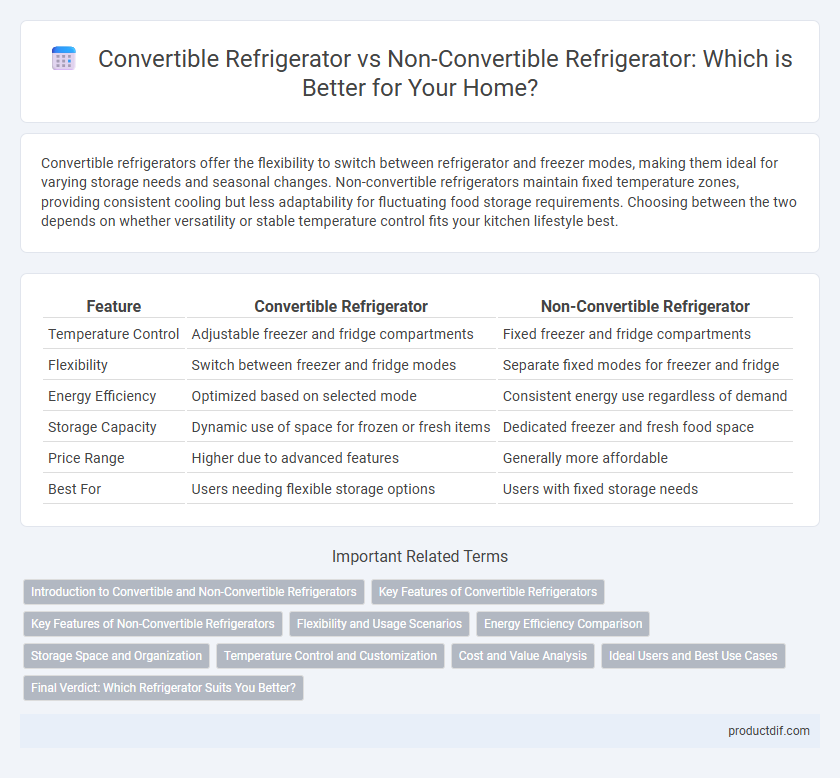Convertible refrigerators offer the flexibility to switch between refrigerator and freezer modes, making them ideal for varying storage needs and seasonal changes. Non-convertible refrigerators maintain fixed temperature zones, providing consistent cooling but less adaptability for fluctuating food storage requirements. Choosing between the two depends on whether versatility or stable temperature control fits your kitchen lifestyle best.
Table of Comparison
| Feature | Convertible Refrigerator | Non-Convertible Refrigerator |
|---|---|---|
| Temperature Control | Adjustable freezer and fridge compartments | Fixed freezer and fridge compartments |
| Flexibility | Switch between freezer and fridge modes | Separate fixed modes for freezer and fridge |
| Energy Efficiency | Optimized based on selected mode | Consistent energy use regardless of demand |
| Storage Capacity | Dynamic use of space for frozen or fresh items | Dedicated freezer and fresh food space |
| Price Range | Higher due to advanced features | Generally more affordable |
| Best For | Users needing flexible storage options | Users with fixed storage needs |
Introduction to Convertible and Non-Convertible Refrigerators
Convertible refrigerators offer versatile temperature zones, allowing users to switch compartments between fridge and freezer modes to accommodate varying storage needs. Non-convertible refrigerators maintain fixed temperature settings for each compartment, providing consistent cooling but less flexibility for different food types. Both types cater to diverse lifestyle demands, with convertible models enhancing adaptability and non-convertible units ensuring stable preservation conditions.
Key Features of Convertible Refrigerators
Convertible refrigerators offer adjustable compartments that easily switch between freezer and fridge modes, providing versatile storage options for varying needs. Advanced models include digital temperature controls, humidity regulation, and multi-zone cooling technology to preserve different food types efficiently. These refrigerators enhance energy efficiency by allowing users to customize the cooling space according to seasonal requirements or food storage demands.
Key Features of Non-Convertible Refrigerators
Non-convertible refrigerators feature fixed freezer and fridge compartments, providing consistent temperature zones optimized for specific food storage needs. They typically offer separate controls for the freezer and refrigerator sections, ensuring stable cooling without the risk of accidental mode changes. Designed with energy efficiency and straightforward operation in mind, these models are ideal for users seeking reliable and hassle-free refrigeration.
Flexibility and Usage Scenarios
Convertible refrigerators offer enhanced flexibility by allowing users to switch compartments between freezer and refrigerator modes, adapting to varying storage needs such as increased fresh produce or frozen goods. Non-convertible refrigerators maintain fixed temperature zones, which limits customization but ensures consistent conditions for specific food preservation. This adaptability makes convertible models ideal for households with fluctuating storage demands, while non-convertible units suit users with stable, routine refrigeration requirements.
Energy Efficiency Comparison
Convertible refrigerators offer enhanced energy efficiency by allowing users to switch compartments between fridge and freezer modes based on seasonal needs, reducing unnecessary power consumption. Non-convertible refrigerators maintain fixed temperature zones, often leading to higher energy use when cooling areas are underutilized. Energy Star ratings frequently favor convertible models due to their adaptive cooling technology, resulting in lower electricity bills over time.
Storage Space and Organization
Convertible refrigerators offer versatile storage space by allowing users to switch compartments between fridge and freezer modes, optimizing organization for varying needs. Non-convertible refrigerators have fixed compartments designed specifically for either refrigeration or freezing, limiting flexibility but often providing consistent temperature control. The ability to customize storage zones in convertible models enhances food preservation and efficient use of space compared to traditional non-convertible units.
Temperature Control and Customization
Convertible refrigerators feature adjustable temperature zones that allow users to switch compartments between fridge and freezer modes, providing enhanced temperature control and customization based on storage needs. Non-convertible refrigerators have fixed temperature settings for each compartment, limiting flexibility in preserving different types of food. This adaptability in convertible models offers superior convenience and energy efficiency by optimizing cooling performance tailored to varying food storage requirements.
Cost and Value Analysis
Convertible refrigerators typically cost 20-30% more than non-convertible models due to their dual-function technology that allows automatic switching between freezer and fridge modes. The higher upfront price is offset by the added flexibility and energy savings, providing better long-term value for households with varying storage needs. Non-convertible refrigerators offer a lower initial investment but lack adaptability, potentially leading to inefficient energy use and limited storage options.
Ideal Users and Best Use Cases
Convertible refrigerators suit users seeking flexible storage for varying food types, ideal for small families or singles who need adjustable temperature zones to switch between fridge and freezer modes. Non-convertible refrigerators are best for users with consistent storage needs, such as large families who require a dedicated fridge and freezer with stable, separate compartments. Choose convertible models for versatility in limited spaces, while non-convertible models excel in households prioritizing capacity and straightforward temperature management.
Final Verdict: Which Refrigerator Suits You Better?
Convertible refrigerators offer versatile cooling options by allowing users to switch between freezer and fridge modes, making them ideal for households with fluctuating storage needs. Non-convertible refrigerators provide a dedicated cooling configuration with typically lower energy consumption and better temperature stability for consistent use. Choosing between convertible and non-convertible models depends on your specific storage requirements, energy efficiency preferences, and budget constraints.
Convertible Refrigerator vs Non-Convertible Refrigerator Infographic

 productdif.com
productdif.com